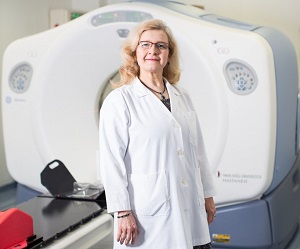
Gallium-68 (Ga-68) PSMA PET / CT Imaging and Lutetium-177 (Lu-177) PSMA Therapy, which is the gold standard in the diagnosis and treatment of prostate cancer, the most common species of cancer in men over 50 years, is starting to be applied at the Department of Nuclear Medicine of the Near East University Hospital very soon. Diagnosis will be possible at a very early stage of this disease and it can be controlled with this application.
It will also be a hope for advanced stage patients who do not respond to other treatments.Near East University Hospital Department of Nuclear Medicine specialist Prof. Dr. F. Suna Kıraç and Assist. Prof. Dr. Deniz Bedel stated that the Ga-68 PSMA application has been accepted as the gold standard in the diagnosis of prostate cancers in the world for a while, in the diagnosis and treatment of cancer diseases, and the measures taken and technological innovations in medicine have enabled to achieve promising results, and one of them is the (Prostate-specific membrane antigen) PET / CT imaging and Lu-177 PSMA treatment for tumor cell destruction.
It was stated that Ga-68 PSMA and Lu-177 PSMA applications and the technological equipment infrastructure (radiopharmaceutical synthesis unit) required in the diagnosis and treatment of prostate cancer will be established soon at the Near East University Hospital Department of Nuclear Medicine.
Prof. Dr. F. Suna Kıraç; "Even at minimum PSA heights, Ga-68 PSMA PET / CT can detect tumor tissue with accuracy over 90%."
In recent years, the Ga-68 PSMA PET / CT imaging method in prostate cancer diagnosis, staging, and in determining the extent of planning and evaluation of the treatment has been used safely. Prof. Dr. F. Suna Kıraç said that the imaging and treatment of tumor cells is made possible by the binding of intelligent molecules used in the diagnosis of cancer such as PSMA on the surface of the majority of prostate cancer cells.
She stated that, after the Ga-68 PSMA was applied to the patients diagnosed with prostate cancer, PET / CT whole body scan was performed similar to the PET / CT imaging procedure used in the diagnosis and treatment of other cancer types. Prof. Dr. F. Suna Kıraç stated that even at minimum PSA (prostate-specific antigen) heights, tumor tissues and metastases can be detected with accuracy over 90%; Thus, the process of the disease stage and treatment approach with Ga-68 PSMA PET / CT is much more successful than all other diagnostic methods.
Department of Nuclear Medicine Specialist Assist. Prof. Dr. Deniz Bedel said "Prostate cancer often spread to the organ, such as lymph glands and bones in tissues by revealing important side effects that can be prevented by this method of treatment, and in the follow-up of the treatment the disease relapse can be investigated by methods such as the examination of findings, blood PSA values or ultrasound, computerized tomography, magnetic resonance imaging (MRI) , however, the Ga-68 PSMA PET / CT method is much more successful and reliable than all of these methods.
Assist. Prof. Dr. Deniz Bedel; “Lu-177 PSMA Treatment enables Successful Results in Patients along with Other Unresponsive Patients and Advanced Stage Prostate Cancer.”
“Prostate cancer cells detected by Ga-68 PSMA can be successfully treated by applying Lu-177 PSMA, and the patient's survival and life quality can be improved with this treatment. Deniz Bedel said that the Lu-177 PSMA treatment is effective especially in patients with metastatic prostate cancer and is an increasingly used method. This treatment aims to reduce the tumor, stop the spread and reduce the pain caused by the disease reported.
Assist. Dr. Deniz Bedel pointed out that Lu-177 PSMA treatment is mostly used in patients who do not respond to other treatments and in cases of advanced prostate cancer and contributes to the long-term control of the disease.
Prostate Cancer Symptoms
In the later stages of prostate cancers, which usually do not show any symptoms, slow or weak urine flow or need to urinate more frequently, urine blood, erectile dysfunction (impotence), pain complaints in hip, back, chest or other areas due to bone metastases, numbness or weakness in the legs or feet, loss of bladder or bowel control due to spinal cord compression can be encountered.